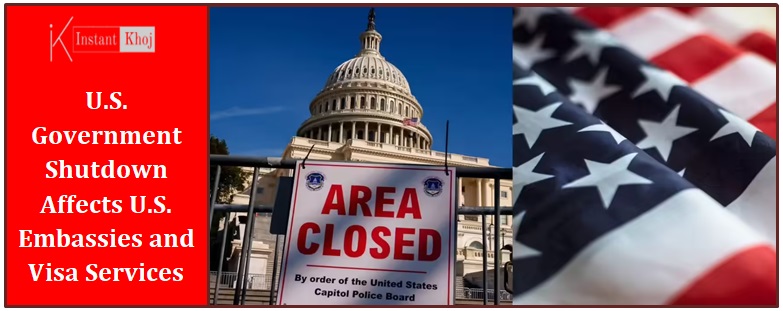Table of Content
- The Basics: What Happens During a Government Shutdown?
- How Embassies / Consulates Are Affected
- 1. Operations Continue, But Limited
- 2. Public Communications & Social Media Silence
- 3. Visa & Passport Services: Mixed Fate
- 4. Immigration-Related Services & Labor Certifications
- 5. Risks & Uncertainties
- Real-World Examples & 2025 Highlights
- What It Means for Stakeholders
- For Visa Applicants / Travelers
- For U.S. Citizens Abroad
- For U.S. Employers / Petitioners
- For Policy Makers & Diplomats
- Frequently Asked Questions (FAQ)
- Q1: Will embassies be completely closed during a shutdown?
- Q2: Can I still apply for a U.S. visa or passport at an embassy during a shutdown?
- Q3: Will my visa appointment get canceled?
- Q4: Are U.S. citizens abroad still protected and served by embassies during a shutdown?
- Q5: Does a shutdown affect immigration processing inside the U.S.?
- Q6: Will federal employees at embassies receive back pay after the shutdown?
- Q7: What can I do to minimize risk if I need consular or visa services during a shutdown?
- Conclusion
In October 2025, the United States entered a partial shutdown due to a failure in Congress to pass appropriations legislation to fund government operations. While much attention focuses on furloughed domestic agencies and federal wages, one area of significant impact is how a shutdown ripples through U.S. embassies and consulates abroad. In this article, we’ll examine how diplomatic missions are affected, what services may remain (or be curtailed), and what it all means for visa applicants, U.S. citizens overseas, and international travelers.
The Basics: What Happens During a Government Shutdown?
A U.S. government shutdown occurs when Congress fails to pass the necessary appropriations bills (or a continuing resolution) to fund federal agencies. Without that legal authority to spend, non-essential operations are suspended, and many federal employees are furloughed (i.e., placed on temporary unpaid leave). Some essential services may continue (e.g., national security, law enforcement, or other critical functions). After the shutdown ends, appropriations are typically passed retroactively, and affected federal employees receive back pay under laws such as the Government Employee Fair Treatment Act of 2019.
However, even with back pay, the disruptions can be significant, particularly to services that rely on staff time, coordination, and interagency cooperation.
For embassies and consulates, the situation is more complex. Diplomatic missions are a hybrid: they are functionally part of the U.S. Department of State, but many consular and visa services are (or have been) funded via fees, not direct congressional appropriations. Whether and how those services continue during a shutdown depends on the embassy, staffing, local funding, and what is judged “essential” or “emergency.”
How Embassies / Consulates Are Affected
Here is a breakdown of how embassies and diplomatic services tend to be impacted during a federal shutdown:
1. Operations Continue, But Limited
The U.S. State Department typically prepares contingency plans for shutdowns. Even when domestic U.S. agencies furlough many employees, embassies and consulates are considered critical for national security and U.S. citizen protection abroad. In many cases, embassies remain operational to provide essential services such as:
-
Assistance to U.S. citizens in distress (medical emergencies, arrests abroad, evacuations).
-
Diplomacy and national security functions.
-
Some limited visa/passport services, especially for emergencies.
-
Consular services funded by user fees, where possible.
That said, the scale and scope of operations may be reduced: fewer staff available, non-urgent tasks are deferred, and internal operations are minimized.
2. Public Communications & Social Media Silence
One visible effect is that embassies often scale back their public presence. During shutdowns, embassies and consulates may pause general social media updates, public announcements, and routine outreach, except for urgent safety or security alerts. For example, the U.S. Embassy in India announced that its Twitter (X) account will not be updated regularly until full operations resume, with only critical alerts still being posted.
3. Visa & Passport Services: Mixed Fate
Visa and passport processing are among the areas of greatest concern during a shutdown. The exact impact depends on how much of the consular/visa infrastructure operates on user fees rather than congressional appropriations.
-
In many previous shutdowns, embassies attempted to keep visa and passport services operational, especially for urgent cases, diplomatic visas, or emergencies.
-
However, delays and reduced staffing are common. Some nonessential visa processing may be paused or postponed.
-
In the 2025 shutdown, embassies have stated that passport and visa services will continue “as the situation permits.” The U.S. Embassy in India similarly confirmed that visa/passport services would continue, though delays are possible.
-
In some posts, if fee revenue is insufficient or staff is limited, consulates may reduce hours, limit the number of appointments, or restrict services to urgent or diplomatic cases.
-
Also, it is possible that visa interview appointments may be postponed or canceled, especially if consular staff is reduced.
Thus, while many visa/passport functions survive in principle, users should expect delays, uncertainty, and possible rescheduling.
4. Immigration-Related Services & Labor Certifications
While embassies perform the visa side, many immigration functions are spread across U.S. agencies like the Department of Labor (DOL), U.S. Citizenship and Immigration Services (USCIS), and others. The shutdown’s biggest disruptions tend to hit those areas more severely than the consular side.
-
The Department of Labor’s Office of Foreign Labor Certification (OFLC), which processes Labor Condition Applications (LCA) and PERM labor certifications, usually ceases operations in a shutdown. This affects visa petitions (e.g. H-1B) and green card processing dependent on labor certification.
-
E-Verify, which employers use to confirm work eligibility, may be shut down because it is dependent on congressional funding. Employers may need to adopt alternative verification procedures until E-Verify resumes.
-
USCIS itself is largely fee-funded for many of its operations, so many immigration applications (e.g. petitions, adjustment of status, etc.) may continue to be accepted, processed, or adjudicated, though possibly at slower speed. But USCIS operations that depend on appropriations (rather than fees) might be constrained.
-
Other programs (waivers, adjudication systems, or support functions) might also pause or scale back.
Thus, the downstream impact of a shutdown on visa-based immigration and labor-based applications is often felt most by petitioners and employers, rather than consular staff directly.
5. Risks & Uncertainties
-
Because embassies vary in funding, staff levels, local resources, and demand, the degree of service disruption can differ greatly by country and by consulate. Some embassies may weather the shutdown with minimal disruption; others may scale back more sharply.
-
Prolonged shutdowns increase the risk of major delays, backlog accumulation, and strain on consular staff once full operations resume.
-
Applicants requiring time-sensitive travel or immigration steps may suffer serious consequences if delays push them past deadlines.
-
The “as the situation permits” clause often means embassy leadership must continuously reassess staffing, local priorities, and risk.
-
Even when services are nominally open, limited staff might lead to longer wait times, taking longer to respond to inquiries or schedule appointments.
Real-World Examples & 2025 Highlights
-
In 2025, embassies have announced suspension of regular social media updates, and many missions globally have marked “scaled-down” public operations.
-
The U.S. Embassy in India stated that passport and visa services would continue “as the situation permits.”
-
Some visa filings (e.g. H-1B) were paused because the DOL’s LCA process is not operational.
-
Global coverage suggests embassies will limit non-essential communications while maintaining consular services for U.S. citizens and critical visas.
-
Historically, during the 2018–19 shutdown, some embassies reduced staff, delayed visa processing, and deferred routine services while still maintaining critical functions.
What It Means for Stakeholders
For Visa Applicants / Travelers
-
Expect delays in processing of non-urgent visa applications, potential postponements of interview slots, and slower response times.
-
Applicants should track the specific embassy or consulate website or announcements, as some may adjust hours or limit services.
-
Avoid planning travel that hinges on tight visa timelines during a shutdown.
-
In urgent or emergency visa cases (medical, humanitarian, diplomatic), embassies may prioritize those even during the shutdown.
For U.S. Citizens Abroad
-
Embassies will normally continue to provide essential services like emergency passports, consular assistance, and crisis response.
-
However, non-urgent consular support (e.g. routine document legalization) might be delayed or limited.
-
Public communications (e.g. local safety alerts) may be slower or less frequent.
For U.S. Employers / Petitioners
-
Projects depending on new H-1B filings, or labor certification (PERM) and LCA processing, can suffer direct delays because the DOL will likely be nonfunctional.
-
If E-Verify is down, employers must use alternative Form I-9 verification processes until it is restored.
-
Backlogs may grow, and timing risks may emerge for employees awaiting status changes or work authorizations.
For Policy Makers & Diplomats
-
A shutdown constrains diplomatic engagement, slows negotiations, and reduces the bandwidth of U.S. foreign policy at a time when international signaling matters.
-
U.S. missions abroad may lose momentum in cultural, educational, or development programs that require sustained staffing.
-
The reputational image of reliability and consistency may suffer when visa or consular services become uncertain.
Frequently Asked Questions (FAQ)
Q1: Will embassies be completely closed during a shutdown?
A1: No — in nearly all cases, embassies and consulates will not completely shut down. They are considered essential for national security, emergency support, and diplomatic presence. However, non-essential operations, outreach, or internal tasks may pause or scale back.
Q2: Can I still apply for a U.S. visa or passport at an embassy during a shutdown?
A2: Yes, but with caveats. In many posts, visa and passport processing continues to the extent possible, especially for emergency, diplomatic, or priority cases. But expect delays, limited appointment availability, or rescheduling of non-urgent applications.
Q3: Will my visa appointment get canceled?
A3: Potentially. Some consulates may reschedule noncritical appointments, reduce daily slots, or adjust hours if staff is reduced. If you have a confirmed appointment, monitor updates from the embassy/consulate and be prepared for changes.
Q4: Are U.S. citizens abroad still protected and served by embassies during a shutdown?
A4: Yes — consular support for U.S. citizens in distress (e.g. lost passports, arrest, medical emergencies, natural disasters) is a priority and generally continues. But non-urgent services may face delays.
Q5: Does a shutdown affect immigration processing inside the U.S.?
A5: It depends. USCIS is largely fee-funded, so many immigration processes within the U.S. (such as adjustment of status, petitions) may continue, albeit potentially slower. However:
-
The Department of Labor’s labor certification functions (LCA, PERM) often cease in a shutdown.
-
E-Verify may be unavailable.
-
Some support or administrative functions may slow or pause.
Q6: Will federal employees at embassies receive back pay after the shutdown?
A6: Typically yes. Under the Government Employee Fair Treatment Act of 2019, federal employees (including those furloughed during a shutdown) are entitled to retroactive pay once funding is restored.
Q7: What can I do to minimize risk if I need consular or visa services during a shutdown?
A7: Here are some tips:
-
Try to schedule essential visa or passport work well ahead of anticipated shutdown windows.
-
Monitor the embassy/consulate’s announcements, social media, and website for any updates.
-
If your case is urgent (medical, family, humanitarian), inform the embassy and ask whether priority processing is available.
-
For immigration petitioners, attempt to file or complete labor certification or LCA steps before the shutdown, if deadlines permit.
-
Be flexible in plans; expect delays and possible rescheduling.
Conclusion
A U.S. government shutdown poses serious challenges — not just domestically, but also in the global realm through embassies and consulates. While diplomatic missions strive to maintain essential functions, many services are inevitably disrupted. Visa and passport operations may limp along, communications often go silent, and labor or immigration processing may stall. For travelers, immigrants, and U.S. citizens abroad, the effects are real — delays, uncertainty, and added risk.
Also Read:
RBI Keeps Repo Rate Unchanged at 5.5%: What It Means for You
YouTube Premium Lite India Launch — Affordable Ad-Free Plan
Follow Blog’son Instantkhoj for more latest stories and trending topics.




